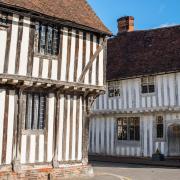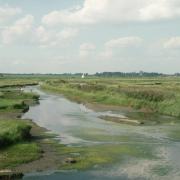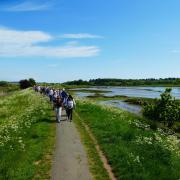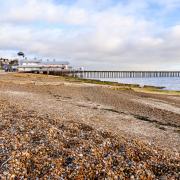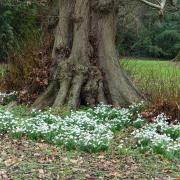Tessa Allingham books at table at Mariners in Ipswich to meet with the creative force behind Red Rose Chain theatre company

“Yesterday was fine, quite cool. Tomorrow’s going to be a bit warmer and still dry. There may be a bit of drizzle Friday evening, then the weekend looks clear again, but a bit patchy going into next week.”
Jo Carrick admits to weather geekery, but it’s forgivable. As the creative whizz behind Red Rose Chain theatre company’s summer outdoor productions – as well as its myriad other performances – she spends a lot of time crossing her fingers and scrolling through her weather app.
“I know the forecast off by heart,” she says. “The weather obviously has a big impact on ticket sales, and I can’t help but worry about it.” We meet on a hot August day at Mariners, the floating restaurant on Ipswich marina that belongs to Régis Crépy of The Great House and Maison Bleue renown. For all its immaculate polished wood and brasswork, impeccable tableware and faultless service, it’s a relaxing place to be.
“It’s a real treat to come here,” Jo smiles. “Definitely my favourite place in Ipswich.” We sit by the window looking out over the bright whiteness of moored yachts and the smartly repurposed wharf buildings. Jo is about to go into the final week of her company’s witty and original interpretation of A Midsummer Night’s Dream, performed outside in a fairy-lit woodland clearing at Jimmy’s Farm, Wherstead. It couldn’t be a more Dream-like setting for this riotous agglomeration of steampunk, hippy-dippiness and outrageous campness.
Jo has been there every evening of the six-week run, often with her 10-year-old son, Ted. “He’s a great help and very good at announcing the prize draw winners in the interval. I’m most often by the bins at the gate saying hello and goodbye to people. It’s a great way to make people feel welcome and to get some feedback at the end of the evening.” That feedback is vital. Everything Jo does is channelled towards bringing Shakespeare and theatre in general to as wide an audience as possible.
Our starters arrive. Crisp filo pastry is the base for a harmonious trio for Jo – soft ripe brie, just-cut shards of Granny Smith apple, and crunchy walnut. My lobster and cured salmon salad is carefree summer on a plate. Both dishes, we decide, are delicious.
“Watching Shakespeare can be a spiritual, cathartic experience – the comedies just as much as the tragedies – and it can also be deadly dull and irrelevant,” says Jo. “When I’m working on a concept I always have a disaffected 13-year-old boy in my mind. If it works for him, it will work for most people.”
Easier said than done, I suggest. “It’s a long process. I start by cutting. Most Shakespeare plays are around 17,000 words and I need to cut to 13,500 if the performance is to be done by about 10pm. Later than that, people just want to go home.” The red pen strikes first through political debate, meaningful to a 16th century audience but lost on us. “At that stage, I have a concept in mind, a look that I build with a mood board on my iPad. Sometimes I interpret passages as music or dance as a way of breaking up the pace and losing some words.” Above all else the production must be enjoyable.
“I am a Shakespeare nut. I love how every human experience can be traced back to Shakespeare, and how so much of it is exciting, raucous fun.” Our mains arrive and the conversation swerves to food.
“My mother was Italian so food has always been important, but I don’t take it too seriously. I’m quite a good cook and definitely good at throwing together ingredients to make a meal.” With all due respect, Jo’s thrown-together meal might not match what is put in front of us – the tenderest fillet of chicken with black pudding and crisp-topped potato gateau for me, and soft seabass given a salty kick from feta and black olives and peppery punch from a collection of mixed herbs.
English at Cambridge University seems to have been little more than a three-year formality for Jo, though postgrad studies at the Central School of Speech and Drama were inspiring. Her theatrical family background (her father was director of the Queen’s Theatre, Hornchurch) no doubt helped her refine her vision to create “something different”. She set up Red Rose Chain in her early twenties. The company marks its 25th anniversary this month with a silvery party at its Gippeswyk Hall HQ in Ipswich. It is determinedly community-based, bringing theatre, workshops and a youth programme to hard-to-reach groups as well as a more conventional public.
Much of the community work, managed by Kirsty Thorpe happens at the company’s own theatre, The Avenue, opened earlier this year with the help of £1m funding from the Heritage Lottery Fund.
The Youth Theatre is close to Jo’s heart. Jimmy Grimes, her adopted son – he’s now 33 – was one of its very first members. He acted and directed as he got older and is now the director of puppetry at War Horse.
Playwriting. Tucking herself away in her writing cabin at home near Ipswich is what Jo really loves. Acclaimed plays include Fallen in Love, an emotional two-hander about the lives of Anne Boleyn and her brother George, from carefree teenagers to the accusation of incest and subsequent execution. It played to rave reviews at Gippeswyk Hall and the Tower of London in 2013. Then came Progress, a play that follows Elizabeth I, aged 27, during a four-day visit to Ipswich in 1561. The third part of the trilogy, set in the Stuart period, is a work in progress.
“The plays demand a huge amount of research, but I enjoy that, especially if it’s about the Tudor period, which I love.” Now, however, she is writing Red Rose Chain’s Christmas production, an adaptation of Beatrix Potter’s The Tale of Mr Todd.
Pudding? We share a limey, creamy, buttery-biscuit based cheesecake, a delicious end to the meal. But Jo can’t linger. She has an anniversary party to organise, a Christmas play to write and the next summer production to plan. She’s thinking The Tempest complete with giant puppets, a dramatic shipwreck, a splash zone. Deadly dull it most certainly will not be.








